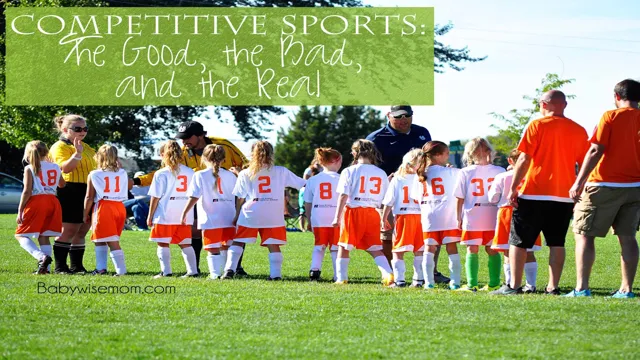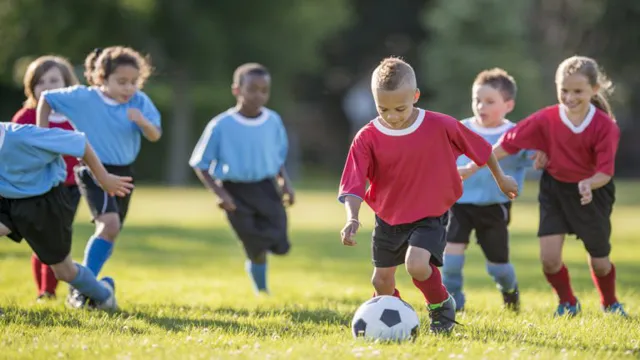Does your child participate in competitive sports? If not, you may be missing out on some of the many benefits they offer. Competitive sports and kids go together like peanut butter and jelly, offering a variety of physical, mental, and social advantages for children of all ages. From increased physical fitness to improved self-confidence and teamwork skills, there are many reasons to consider signing your child up for a competitive sport.
But is competitive sports right for every child? In this blog, we’ll explore the pros and cons of competitive sports and how to ensure your child gets the most out of them. So let’s dive in and discover why competitive sports may be just what your child needs to thrive.
Benefits
Competitive sports can be beneficial for kids in various ways. Firstly, they encourage physical activity, helping develop the child’s health and fitness. Secondly, sports teach kids about teamwork, sportsmanship, and communication.
Kids learn to cooperate with others, accept defeat, and celebrate victories together. Thirdly, being part of a team can help foster a sense of belonging and confidence. Children learn to take responsibility, set goals, and work hard to achieve them.
Lastly, competitive sports also teach kids about time management and organization as they must balance practice, games, and school work. While there are potential risks associated with competitive sports, such as injury or burnout, the benefits they offer make them worthwhile. With proper coaching and supportive parents, children can enjoy competitive sports while still maintaining a healthy work-life balance.
So the answer to the common question “are competitive sports good for kids?” is yes, with moderation and proper guidance.
Improves physical health
Regular physical activity offers countless benefits for your physical health. From building stronger muscles and bones to improving your cardiovascular system, exercise is a crucial factor in maintaining a healthy body. Engaging in physical activities like running, weightlifting, or even taking a walk can help you burn calories, lower your risk of chronic diseases like obesity, diabetes, and heart disease, and boost your mood.
Additionally, physical activity stimulates the production of endorphins, the “feel-good” neurotransmitters, which can help you manage stress and anxiety. Incorporating exercise into your daily routine isn’t just a way to achieve a certain body aesthetic but also a path towards a healthier, happier you. So, start small, find activities that you love, and gradually work your way up to a regular exercise regimen.
Your body will thank you for it!

Teaches teamwork and discipline
Playing team sports is not only fun, but it also teaches teamwork and discipline. These two benefits go hand in hand, as players must work together towards a common goal and each player must also be responsible for their own role in the team. Teamwork allows players to develop communication skills, trust, and respect for each other.
By working towards a shared objective, players learn to rely on each other’s strengths and support each other in their weaknesses. Discipline is also essential for success in sports. Through regular practice and adherence to rules and regulations, players learn to control their own behavior and emotions, both on and off the field.
This discipline translates into other areas of life, such as school or work, where responsibility and focus are necessary for success. Overall, team sports provide a fun and valuable way to learn important life skills that can benefit individuals in all aspects of their lives.
Boosts confidence and self-esteem
Boosting one’s self-confidence and improving self-esteem are among the most significant benefits of any endeavor, and learning is no exception. Studying and acquiring new skills can instill a sense of pride and accomplishment, which can lead to increased self-worth. As we progress along a learning path, we encounter new challenges that we must overcome, which can often lead to a sense of fulfillment and pride.
Additionally, we gain knowledge and expertise in new areas, which boosts our confidence and provides us with a sense of self-worth. This heightened confidence and self-esteem can spill over into other aspects of our lives, leading to improved relationships, career success, and overall happiness. So, if you’re seeking to improve your self-confidence and self-esteem, embarking on a learning journey can be a great way to achieve these goals.
Challenges
Are competitive sports good for kids? There is no simple answer to this question. While many parents believe that competitive sports offer numerous benefits for their children, others worry about the potential for injury and stress. On one hand, participating in competitive sports can teach kids important life skills such as teamwork, goal-setting, and perseverance.
It can also help them stay physically active and healthy. On the other hand, some kids can become overly focused on winning and lose sight of the importance of fun and fair play. Additionally, the pressure to succeed can lead to burnout and injury.
Ultimately, it’s up to each individual family to weigh the pros and cons and make a decision based on their child’s personality and interests. It’s important to remember that every child is unique and what works for one may not work for another. So, are competitive sports good for kids? The answer is not black and white, but rather depends on each child’s individual needs and goals.
Risk of injury
When it comes to physical activities, there is always a certain level of risk involved, and this is especially true when it comes to sports. As much as we love the thrill and adrenaline rush of playing sports, it’s important to recognize the challenges inherent in these activities. Risk of injury is one of the biggest challenges that athletes face, regardless of the sport they play.
Whether it’s a minor sprain or a serious concussion, the potential for injury is always present. And while some injuries may be unavoidable, there are steps that athletes can take to minimize the risk. This includes wearing appropriate protective gear, warming up properly before the game or practice, and practicing good form and technique.
By taking these steps, athletes can enjoy the benefits of sports while minimizing the risk of injury.
Pressure to perform
Pressure to perform is something that can affect anyone, from students to athletes to professionals. It can stem from external expectations or internal goals, but either way, it can lead to a lot of stress and anxiety. One of the biggest challenges of this pressure is that it can be difficult to know how to handle it.
Some people may try to push themselves harder, while others may feel overwhelmed and give up. Finding a balance between pushing yourself and giving yourself a break is key. It’s important to set realistic goals and not be too hard on yourself if you don’t meet them right away.
Remember, it’s okay to take a step back and reassess if things aren’t working out. Ultimately, the pressure to perform can be a double-edged sword. It can motivate us to achieve great things, but it can also take a toll on our mental health.
The key is to approach it with a healthy mindset and to not let it consume us.
Over-specialization
Over-specialization can often lead to challenges in today’s rapidly changing job market. While it’s important to have a specific skill set, focusing too much on one niche area can make it difficult to adapt to new technologies and industries. For example, if a software developer only knows one programming language, they may struggle to find work if that language becomes outdated or less popular.
Additionally, being too narrowly focused can limit opportunities for growth and career advancement. It’s important for individuals to strike a balance between specialization and versatility, continuously learning and expanding their knowledge to stay relevant in the ever-evolving job market.
Conclusion
After careful consideration and examination, it is safe to say that competitive sports can indeed have a positive impact on children. Through sports, kids can learn valuable skills such as teamwork, discipline, and perseverance, while also staying physically active and healthy. However, it’s important to remember that the pressure to win and excel in sports can also lead to negative experiences and stress for children.
Ultimately, it’s up to parents and coaches to create a balanced and supportive environment for kids to participate in competitive sports. As the saying goes, “it’s not whether you win or lose, it’s how you play the game.”
Striking the right balance
Striking the right balance between work and life is one of the biggest challenges faced by people today. With the ever-increasing demands of the workplace, it’s easy to lose sight of the other aspects of our lives that are equally important, such as relationships, health, and hobbies. It’s essential to find a way to strike a balance between all the different aspects of our lives to prevent stress and burnout.
It’s not about sacrificing one for the other; it’s about finding a way to blend them seamlessly. One approach is to prioritize your time, schedule your goals, and measure your progress. Another is to set boundaries and be more intentional about how you spend your time.
Whatever strategy you choose, the key is to make sure it’s sustainable, realistic, and aligns with your values. In this way, you can maintain a healthy balance and achieve your goals without sacrificing your overall well-being.
Final Thoughts
Are competitive sports good for kids? It depends on a few factors. While many benefits come with playing sports – such as building confidence, teamwork skills, and physical fitness – some children may not thrive in a highly competitive environment. It’s important to gauge your child’s interest level and ability before enrolling them in any kind of competitive sport.
Moreover, it’s crucial to ensure that the focus is on athletics and teamwork, rather than winning at all costs. Coaches should prioritize good sportsmanship and healthy competition, rather than putting undue pressure on young athletes to come out victorious. Ultimately, children can learn valuable life skills from playing on a team, but care should be taken to prevent burnout and ensure that they’re enjoying the experience.
If it’s the right fit, competitive sports can be a rewarding experience both on and off the field.
FAQs
What are the benefits of playing competitive sports for kids?
Competitive sports can help improve a child’s physical fitness, build self-confidence, teach teamwork and goal-setting, and provide a sense of accomplishment.
At what age should kids start playing competitive sports?
Children can start playing competitive sports as early as age 3, but it’s important to ensure the sport and level of competition is age-appropriate. Many experts suggest waiting until at least age 6 or 7 before entering children in highly competitive leagues.
What are some potential risks associated with competitive sports for kids?
Some potential risks of playing competitive sports for kids include an increased risk of injury, burnout, and pressure to perform. It’s important to ensure that children are playing sports for fun and personal growth, rather than solely for winning.
How can parents ensure their child’s safety while playing competitive sports?
Parents can ensure their child’s safety while playing competitive sports by ensuring the child wears appropriate protective equipment, only participating in age-appropriate leagues and sports, and being aware of the signs of concussion and other injuries. Additionally, it’s important to provide adequate rest and nutrition for the child to promote overall health and well-being.
